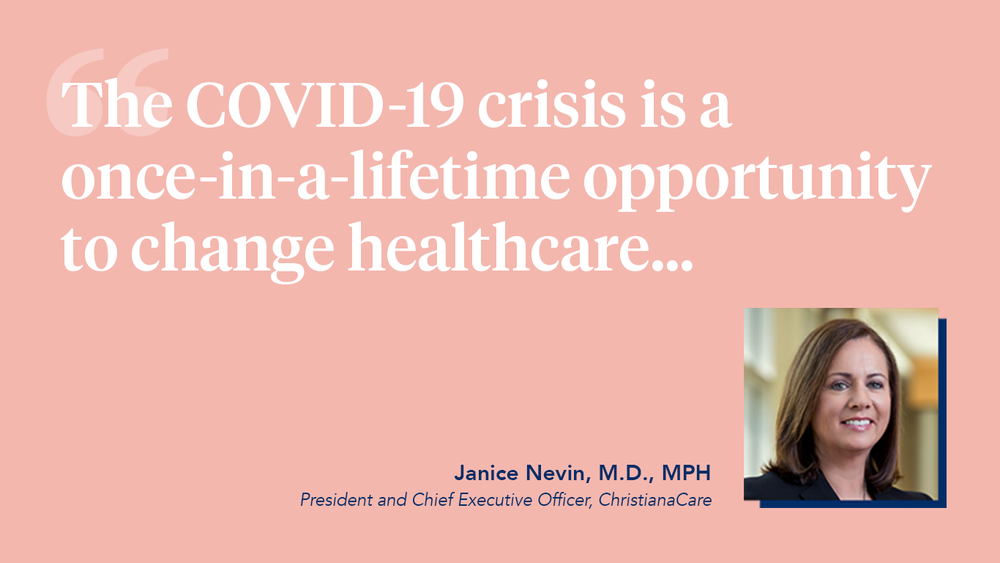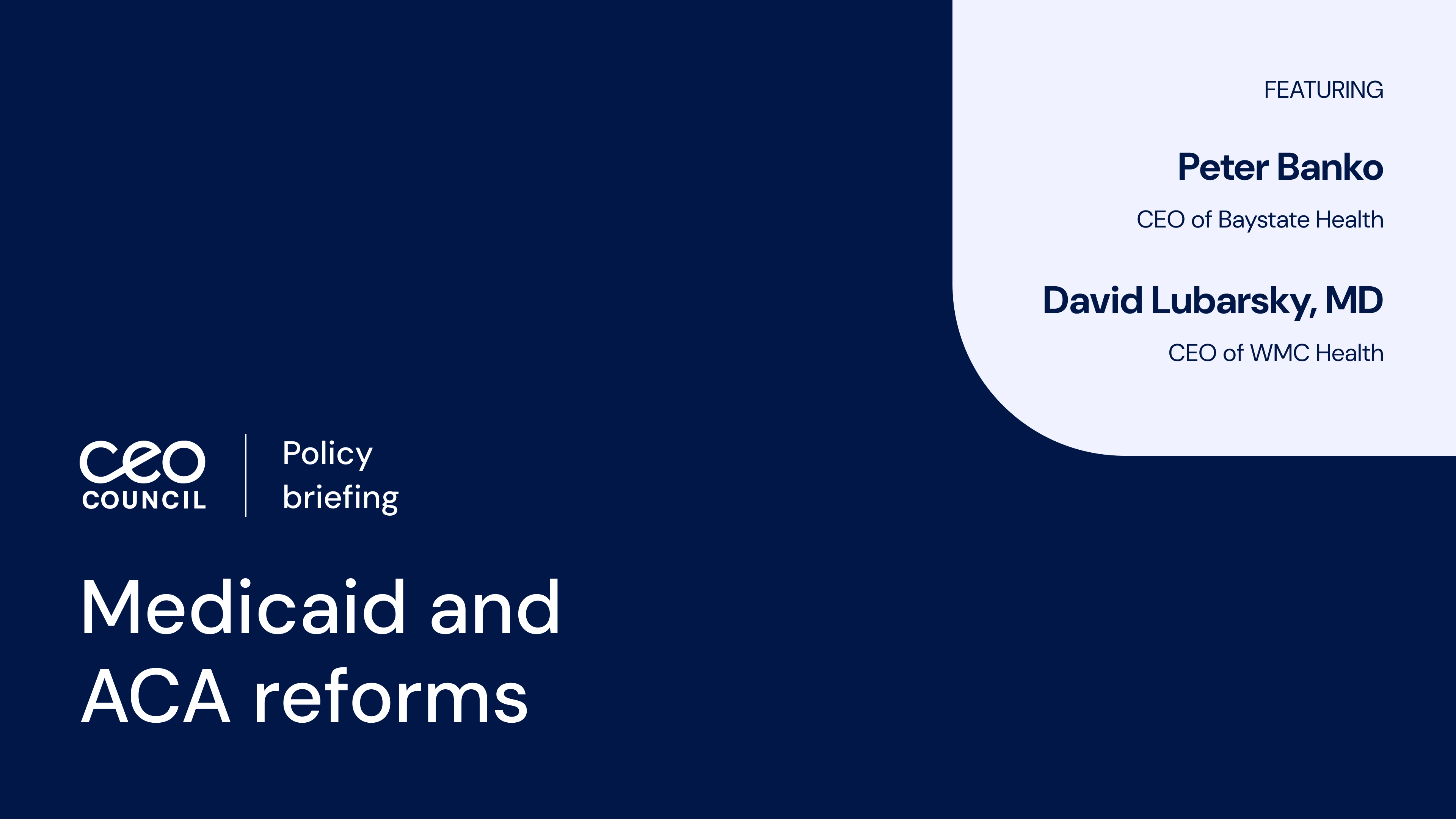While no one would describe the novel coronavirus pandemic itself as “convenient,” it has catalyzed action across the US healthcare system that will likely accelerate a path to convenience (and other important innovations) for patients. “The COVID-19 crisis is a once-in-a-lifetime opportunity to change healthcare systems in a way that creates the future we want and that patients deserve,” said Dr. Janice E. Nevin, MPH, president and CEO of ChristianaCare Health System in Delaware.
In a recent webinar for hospital leaders, Dr. Nevin shared this perspective as well other insights about how the pandemic has incited meaningful transformation in healthcare. Dr. Nevin leads a health system that’s been at the vanguard of many changes even before COVID-19 entered the collective consciousness, including a shift to telemedicine and virtual care, initiatives to combat racial and socio-economic health disparities and a patient-centric focus on enabling “radical convenience.”
Now, many of ChristianaCare’s early innovations are poised to become mainstream requirements as healthcare leaders across the country battle the current challenges brought on by the health crisis. Below is Dr. Nevin’s take on the trends that have made (and will make) a difference in healthcare, both now and in the post-pandemic world.
Trend #1: To improve outcomes and reduce racial health disparities (and even reduce costs), investments in community are key
Even pre-pandemic, population health was a priority for ChristianaCare under Dr. Nevin’s leadership. “The community in which patients live is very much part of how they achieve their health outcomes,” Dr. Nevin explained. “So, we realized that in order to help people get the outcomes they deserved, care increasingly had to happen outside of the four walls of the facilities.”
As a result, ChristianaCare established a virtual patient-centered medical home, in which patients interact with their care team virtually first and are only directed to a physical facility for a specific test or treatment. In addition, ChristianaCare launched a community investment fund that supports community partnerships that address social, behavioral and environmental factors impacting health. One of these partnerships is with Unite Us, which helps patients obtain the social services they need.
“This pandemic has shined a light on the disparities that we knew existed in communities, with communities of color having twice as many positive cases or more of COVID-19 and twice as many deaths,” Dr. Nevin said. To help address these disparities, ChristianaCare stood up care pavilions in vulnerable neighborhoods, focusing not only on COVID-19 testing and care but on connecting with new patients to improve their health.
The added bonus is that many of these initiatives also help drive cost reduction at hospitals (with better patient outcomes to boot). To learn more about these changes, including how they’ve led to a whopping 37% cost reduction for ChristianaCare, go to minute 8:00 of the video interview.
Trend #2: The future of care is ‘radically convenient’ and patient-centric
Across the country, the COVID-19 crisis has led many health systems to implement virtual care strategies, which ChristianaCare already relied upon before the pandemic. But now that so many health systems witnessed the advantages of telemedicine, including its convenience for patients and cost savings, Dr. Nevin believes that telemedicine is here to stay.
Given the continued demand for virtual care, Dr. Nevin believes that health systems must work with regulators to determine the right reimbursement for this approach to care.
“Virtual care is one of the most important ways that we can improve health and take cost out of healthcare,” Dr. Nevin said. “I certainly would be disappointed if we create a fee-for-service virtual care system. I’d love to see instead that payment be reimagined so that we are rewarded for the outcomes we produce, rather than the volume of care we deliver.”
To further improve the convenience of care, ChristianaCare is implementing the Cedar Suite as part of their strategy to create “radical convenience” for patients. “Radical convenience is certainly about how people experience care. But we also need solutions to how people experience the administrative aspects of receiving care [such as billing and financial engagement]. Cedar’s platform will allow our patients to handle administrative aspects of care on their smartphone from the comfort of their couch. And that kind of convenience is what we’re all about,” Dr. Nevin said.
ChristianaCare is also committed to improving patients’ experience of care by “being person-centric, respecting culture and language, and creating a person-focused, health-focused delivery system,” Dr. Nevin explained.
To hear the full discussion of these issues, click to 29:14 in the full interview.
Trend #3: ‘Waiting is waste’ but there’s a renewed focus on finding ways to eliminate it
“I would love to get rid of waiting rooms and wait times and anything that has to do with waiting. Waiting is waste,” Dr. Nevin said when asked to describe what other lasting changes she would like to see in healthcare in the wake of the COVID-19 pandemic. She also hopes that the healthcare system as a whole continues to move as quickly as it has during the COVID-19 crisis, when best practices have been created and implemented in days rather than over the course of months and years.
More facilities across the country are exploring the idea of contactless-care as a way to keep patients safe (less exposure to COVID, for instance) but also to eliminate process inefficiencies like extended patient wait times or overutilization of health resources. For example, digital capabilities like virtual care and remote monitoring can help save patients from making unnecessary trips to the ED while freeing up provider capacity to care for patients who require emergency treatment.
“We’ve got to take what we’ve learned during this crisis and rebuild in a way that solves the problems we know we had,” concluded Dr. Nevin.
To learn more about Dr. Nevin’s thoughts on the future of care, go to minute 34:50 of the interview.
To be notified of upcoming Cedar virtual events, click here to join our mailing list.



